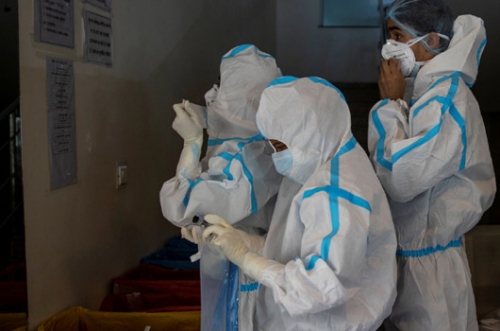COVID-19: With Scant Power or Freezers, Pfizer Vaccine Brings Little Cheer To India
Agencies | New York
The Daily Tribune – www.newsofbahrain.com
Despite hopes raised by Pfizer’s COVID-19 vaccine, it will take huge efforts for India to defeat the coronavirus, with its 1.3 billion population and the world’s second-highest caseload.
Pfizer Inc’s November 9 announcement that initial trials showed their experimental COVID-19 vaccine was more than 90% effective sparked cheer across the world, scarred by a pandemic that has killed 1.2 million people and infected 50.7 million.
But the Pfizer vaccine needs to be stored at temperatures matching an Antarctic winter – a logistical nightmare for India with heatwaves exceeding 50º C, few ultra-cold freezers, patchy power and a largely rural population.
“The new two-shot vaccine from Pfizer has to be maintained at minus 80º C – nowhere on the planet does the logistical capacity exist to distribute vaccines at this temperature,” said Toby Peters, a professor at Britain’s University of Birmingham.
“This is a new challenge to be urgently managed,” Peters, an expert in cooling technologies who is studying plans to roll out COVID-19 vaccines, told the Thomson Reuters Foundation.
About a hundred drug development teams worldwide are racing to develop coronavirus vaccines, with the hope of distributing them globally on a scale never before witnessed.
The World Health Organisation (WHO) estimates about 70% of the global population must be inoculated to end the pandemic.
India will be critical to this effort – with 8.6 million COVID-19 cases, second only to the United States.
The South Asian nation has been scrambling to secure 500 million doses of coronavirus vaccines by July from various manufacturers, in addition to developing its own government-backed COVID-19 vaccine COVAXIN.
India also plans to manufacture up to 200 million doses of candidate vaccines from AstraZeneca Plc and Novavax Inc next year, with funding from the GAVI vaccines alliance and the Bill & Melinda Gates Foundation
India has a strong record on vaccination, with the world’s largest programme distributing 400 million vaccines a year, said Peters.
But nearly half of the leading COVID-19 vaccine candidates need cold storage as low as minus 80º C, researchers say, requiring seamless cold chain distribution from manufacturers to airports to remote villages.
“The success of any COVID-19 vaccination programme will critically depend on robustness of the cold chain,” said Peters.
“The key challenge for COVID-19 immunisation will likely be the last mile distribution and ensuring that each vaccination site is equipped with both adequate fixed and outreach cooling equipment to maintain efficacy of the valuable … vaccine.”
He said this would require investment in new cold chain systems and could include innovative approaches like using drones and new mobile rechargeable micro-chillers.
India’s health ministry did not respond to requests for comment.
To ease distribution, Pfizer has announced that it will provide a “dry ice pack” container for its vaccines that is able to maintain a temperature of minus 70º C for up to 10 days.
Related Posts

